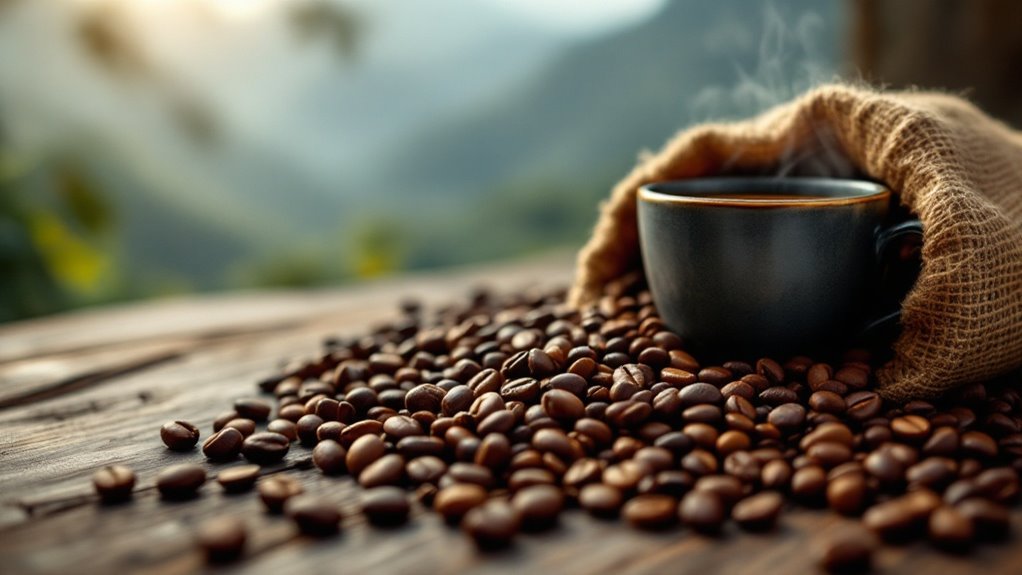





Picture a steaming cup of coffee, its aroma rich with hints of chocolate and toasted nuts, a smooth sip that lingers on your palate. When you think of Brazilian coffee, you're likely imagining beans from regions like Minas Gerais or Cerrado, where the climate and soil create some of the world's finest Arabica varieties. But what makes one stand out above the rest? Is it the Bourbon Santos' velvety texture or the Cerrado Mineiro's balanced acidity? The answer might surprise you, and it's not just about the beans—it's how they're roasted and brewed that reveals their true potential.
Key Takeaways
- Cerrado Mineiro: High-quality Arabica beans with fruity notes, ideal for balanced and flavorful coffee.
- Bourbon Santos: Premium variant offering rich, nutty undertones and a smooth, low-acidity profile.
- Mogiana Coffee: Consistently balanced flavor from São Paulo, perfect for traditional and modern brewing methods.
- Café Bom Dia: Sustainable single-origin beans with citrus notes, known for ethical production and quality.
- Cooxupé: Largest private cooperative, producing premium Arabica beans with exceptional chocolatey and nutty richness.
Flavor Profile
Brazilian coffee's flavor profile is defined by its chocolatey, nutty richness and low acidity, making it a standout in the global coffee landscape. When you taste Brazilian coffee, you'll notice prominent chocolate notes, often accompanied by hints of molasses, walnut, and pecan. These flavors create a harmonious balance, delivering a smooth finish that lingers pleasantly on your palate. The low acidity, with a pH of around 5.1, guarantees a mellow cup, ideal if you're sensitive to sharper, more acidic coffees.
The natural processing methods used in Brazil enhance the coffee's inherent sweetness, sometimes introducing subtle red fruit undertones that complement its nutty base. A medium roast amplifies this balance, showcasing semi-transparent brown tones and a well-rounded flavor profile. You'll find that the nutty and chocolate notes shine without overpowering the cup, making it versatile for both espresso and drip brewing. Whether you're savoring it black or with milk, Brazilian coffee's smooth finish and low acidity make it a comforting, approachable choice for any coffee lover. Its regional specificity, rooted in Brazil's fertile soils and ideal climate, secures a consistently rich and satisfying experience.
Popular Varieties
Among the diverse coffee offerings from Brazil, several varieties stand out for their distinct characteristics and regional influences. Santos Coffee, one of the most recognized Brazilian coffees, is celebrated for its smooth, low-acidity profile, making it a versatile choice for both single-origin and blends. Bourbon Santos, a premium variant, elevates this profile with its rich, nutty undertones and exceptional quality. In São Paulo's Mogiana region, you'll find Mogiana Coffee, prized for its balanced flavor and consistent quality, a hallmark of its meticulous cultivation. Moving to Minas Gerais, the Cerrado Mineiro region produces high-quality Brazilian Arabica beans, known for their fruity notes and suitability for specialty coffee. This region's unique microclimate and elevation contribute to its reputation as one of Brazil's top producing regions. Brazilian Arabica, which dominates 70% of the country's coffee production, is revered for its adaptability and widespread use in global blends. Each of these coffees reflects the rich diversity of Brazil's coffee landscape, offering distinct flavors shaped by their regional terroir. Whether you prefer the smoothness of Santos or the complexity of Cerrado Mineiro, Brazilian coffees deliver exceptional quality and variety.
Roasting Tips
The aroma of freshly roasted Brazilian coffee beans fills the air, signaling the start of a process that releases their signature chocolatey and nutty flavors. To highlight the natural sweetness and full-bodied profile of traditional Brazilian coffee, roast your whole bean coffee to a medium level, typically between city+ and full city. This range enhances the low-acidity, nutty undertones without introducing excessive toasty notes that can mask the coffee's inherent balance. Avoid over-roasting, as it can lead to burnt sugar or dry flavors, diminishing the quality of coffee made from beans grown under Brazil's ideal conditions. For fine espresso, aim for a darker roast, such as full city+, to emphasize the heavy texture and richness characteristic of Brazilian coffee. Stopping the roast just before the second crack preserves the sweetness and avoids bitterness, ensuring a smooth cup. Coffee drinkers seeking the best from Brazil's coffee trees should experiment with roast levels to find the perfect balance, as the region's coffee is grown to deliver a versatile profile that suits both traditional and modern preferences.
Brewing Methods
When brewing Brazilian coffee, selecting the right method is essential to revealing its signature chocolatey, nutty, and low-acidity profile. Brazil coffee, grown across vast coffee fields in regions like Minas Gerais and São Paulo, offers a wide range of flavor profiles depending on the brewing technique. For espresso, its heavy body and low acidity make it a staple in blends, delivering a rich, velvety texture. If you prefer drip or pour-over, medium roasts from Brazilian coffee farms balance sweetness and richness without overpowering toasty notes. The French Press is another excellent choice, as it accentuates the coffee plant's natural oils and deep, nutty undertones. Avoid over-roasting to preserve the delicate balance of flavors that Brazilian coffee farms produce. For lighter methods, experiment with city+ roasts to highlight the coffee's inherent sweetness. Brew temperatures should align with roast levels—darker roasts benefit from slightly lower temperatures to prevent bitterness. Whether you're exploring the coffee fields of Brazil or enjoying a cup at home, these methods guarantee you experience the best coffee in the world.
Notable Brands
Brazil's coffee landscape is defined by its iconic brands, each offering distinct flavor profiles rooted in the country's diverse terroir. Café Pilão, Brazil's most popular brand, delivers a full-bodied, dark-roasted cup with fermented fruit notes, embodying the Brazilian taste. Café do Ponto, sourced from São Paulo and Sul de Minas, offers a medium roast with vibrant flavors and a refined finish, showcasing the richness of these growing regions. Café Melitta, globally recognized, produces an extra-strong, dark-roasted coffee with an intense aroma, a hallmark of coffee produced in Brazil. Café Bom Dia, the largest sustainable coffee producer, highlights single-origin beans with full-bodied citrus notes, often from Chapada Diamantina, a region that has become synonymous with quality. Cooxupé, Brazil's largest private coffee cooperative, guarantees premium Arabica beans with consistent quality, reflecting the expertise of Brazilian coffee companies. These brands not only represent the diversity of Brazil's coffee-growing regions but also elevate the global reputation of Brazilian coffee. Whether you prefer the boldness of Sul de Minas or the refined notes of São Paulo, these brands encapsulate the essence of Brazil became a coffee powerhouse.
Disclosure: As an Amazon Associate, I earn from qualifying purchases.



